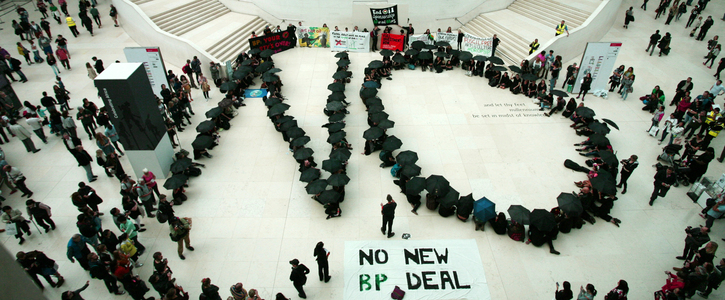10,000 signatures reached
To: George Osborne, Chair of The British Museum
The British Museum: Drop BP

The British Museum’s decision to agree to a new 10-year sponsorship deal with the oil and gas company BP is completely indefensible. It must be reversed.
2023 was the hottest year on record, and communities across the Global South are already facing the devastating impacts of climate change, from floods to wildfires.
From Iraq to the Gulf Coast, many experience the direct impacts of BP’s toxic gas flaring and oil spills, while the execs and shareholders keep raking in record profits
Now, The British Museum has committed to backing BP for a further 10 years, while it pours millions into exploration for new oil and gas that we can’t afford to burn if we want a liveable planet.
Until this reckless deal with BP is dropped, we pledge not to visit, work or collaborate with The British Museum.
2023 was the hottest year on record, and communities across the Global South are already facing the devastating impacts of climate change, from floods to wildfires.
From Iraq to the Gulf Coast, many experience the direct impacts of BP’s toxic gas flaring and oil spills, while the execs and shareholders keep raking in record profits
Now, The British Museum has committed to backing BP for a further 10 years, while it pours millions into exploration for new oil and gas that we can’t afford to burn if we want a liveable planet.
Until this reckless deal with BP is dropped, we pledge not to visit, work or collaborate with The British Museum.
Why is this important?
Enough is Enough. From its refusal to return stolen objects, to its backing for BP, something is seriously wrong at The British Museum.
Last year, Chair George Osborne said, ‘Our goal is to be a net zero carbon museum – no longer a destination for climate protest but instead an example of climate solution.’ That goal is in tatters.
We know that over the last 27 years, BP has used its sponsorship of The British Museum to “artwash” its brand, cleaning-up its toxic reputation by associating its logo with the progressive values of art and culture. It has repeatedly used the museum as an iconic space where it can influence decision-makers during exhibition openings and at private VIP events.
After decades of backing climate delay and denial, BP is still pushing the world deeper into climate breakdown. Earlier this year, BP said it would increase investment in the production of fossil fuels by about $1 billion a year, above its previous plans for the rest of the decade. This is the total opposite direction that we should be heading in.
Crucially, BP’s business plans are not aligned with the goal of limiting global heating to 1.5°C, the target that world leaders have signed up to in the Paris Climate Agreement.
Communities in Argentina, West Papua, Mexico, and Azerbaijan – to name but a few – have faced violence and imprisonment for standing up against BP’s extraction, pollution and corruption. And today, BP continues to work closely with human rights-abusing regimes in order to gain access to their oil and gas reserves, and used its exhibition sponsorship at the Museum to advance its business interests in countries such as Egypt, Iraq and Russia.
But things can change. From the National Portrait Gallery to the Royal Shakespeare Company, most of the cultural sector has largely cut ties to fossil fuel funding, and a new ethical standard for sponsorship has been set.
But once again, The British Museum has chosen to be on the wrong side of history. It has decided to back profit-making polluters, not the people.
Enough is enough.
It’s time to draw a red line - and stop backing BP.
Last year, Chair George Osborne said, ‘Our goal is to be a net zero carbon museum – no longer a destination for climate protest but instead an example of climate solution.’ That goal is in tatters.
We know that over the last 27 years, BP has used its sponsorship of The British Museum to “artwash” its brand, cleaning-up its toxic reputation by associating its logo with the progressive values of art and culture. It has repeatedly used the museum as an iconic space where it can influence decision-makers during exhibition openings and at private VIP events.
After decades of backing climate delay and denial, BP is still pushing the world deeper into climate breakdown. Earlier this year, BP said it would increase investment in the production of fossil fuels by about $1 billion a year, above its previous plans for the rest of the decade. This is the total opposite direction that we should be heading in.
Crucially, BP’s business plans are not aligned with the goal of limiting global heating to 1.5°C, the target that world leaders have signed up to in the Paris Climate Agreement.
Communities in Argentina, West Papua, Mexico, and Azerbaijan – to name but a few – have faced violence and imprisonment for standing up against BP’s extraction, pollution and corruption. And today, BP continues to work closely with human rights-abusing regimes in order to gain access to their oil and gas reserves, and used its exhibition sponsorship at the Museum to advance its business interests in countries such as Egypt, Iraq and Russia.
But things can change. From the National Portrait Gallery to the Royal Shakespeare Company, most of the cultural sector has largely cut ties to fossil fuel funding, and a new ethical standard for sponsorship has been set.
But once again, The British Museum has chosen to be on the wrong side of history. It has decided to back profit-making polluters, not the people.
Enough is enough.
It’s time to draw a red line - and stop backing BP.

